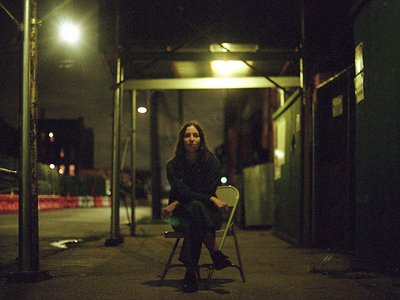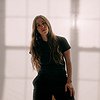Name: Elori Saxl
Nationality: American
Occupation: musician, composer and filmmaker
Current Release: The Blue of Distance on Western Vinyl
Recommendations: The Astounding Eyes of Rita / Anouar Brahem Wede Harer Guzo / Hailu Mergia
Elori Saxl has simple website where you are directed to her current works.
When did you start writing/producing music - and what or who were your early passions and influences? What is it about music and/or sound that drew you to it?
I started writing music when I was about 12, but it’s been a long journey to feel ready to share things. The biggest challenge for me was that there are so many different kinds of music that I love and feel interested in making, and it felt hard to find the sound that gave light to all those voices. I grew up playing violin and was exposed to classical stuff through that. At home, there was always music on, but it was totally across the board. Lots of sort of top 40 compilation CDs like grammy nomination albums or “now that’s what I call…”, early internet radio streaming of similar stuff, some reggae and dub sampler CDs–I guess it was often music with beats that you could dance to. I love how music can help you feel things, and I love how subtle changes in sound can change that feeling. For me, the sound is always dictating what to write.
For most artists, originality is first preceded by a phase of learning and, often, emulating others. How would you describe your own development as an artist and the transition towards your own voice? What is the relationship between copying, learning and your own creativity?
I think copying can definitely be a great way to understand how something is functioning. Lately, I’ve been trying to better understand how my favourite house songs build, and I’ve been trying to just take a song that I like and copy the structure exactly, which has been really illuminating for me. At the same time, at some point I do think you have to put the blinders up and just listen to what’s inside–not because copying is inherently bad but more because it can just be really distracting to be aware of other people’s ideas. When I was writing The Blue of Distance, I didn’t allow myself to listen to any other music until I was totally done, which ended up being like a year of not listening to other music, which was very strange. But it really helped me hear the internal voice and also stay focused on the parameters of the project. I get so excited when I hear other music, and then I want to go try to make something like it, which is fun and invigorating but can also be really distracting and make it hard to finish anything. So, for me, it was a way of helping myself stay committed to one sound until the project was done.
What were your main compositional and production challenges in the beginning and how have they changed over time?
I think the main challenge has been and continues to be having the confidence that the skills and tools I have are enough. Probably in general, that continues to get a little better over time, but the voices of doubt are always knocking at the door. The other challenge for me is deciding where to focus my energy. I’ve spent a lot of time doing film and radio scoring for other people, and I’m often shapeshifting to create the right sound for a project. That’s been a really fun challenge that has definitely helped me improve my production skills, but it can also make it a bit harder to understand what sounds I’m really interested in making on my own. Right now, my biggest challenges are getting better at beat production, singing, and songwriting. I’m trying to make some super solid pop songs, and it’s extremely hard.
What was your first studio like? How and for what reasons has your set-up evolved over the years and what are currently some of the most important pieces of gear for you?
The last few years, I worked out of a 4’ x 4’ windowless plywood closet inside a woodworker’s studio in Brooklyn. It sounds insane, but I loved it. The woodworker was almost never there, so it was quiet, I could fit everything I needed in there, and I could focus, which is all I want in a workspace. I would set timers to remind myself to go outside so I didn’t go crazy. My main tools have been my Juno-106, which I was gifted about 10 years ago by a friend’s dad, my computer with Ableton, a zoom recorder, headphones, and a midi keyboard. I’ve really sort of embraced that a computer and a midi keyboard are the folk instruments of today, and I’ve been reticent to spend more money on my setup. The last few months, I’ve finally forced myself to make some very minor upgrades: getting a better interface, buying monitors, actually buying the basic decent plugins for delay, eq, reverb etc., but the general setup is basically the same. The biggest change is that I moved out of Brooklyn and into the woods, and I’m now working in a room with a window and a view of trees and a lake.
[Read our feature on the Juno 106]
How do you make use of technology? In terms of the feedback mechanism between technology and creativity, what do humans excel at, what do machines excel at?
This interplay is definitely pretty central to what I make and something I think about constantly. Humans excel at feeling, at making connections and synthesizing, and at listening (potentially). Machines excel at precision. One trap I’ve fallen into is writing music using machines (like midi samples) then re-tracking parts with human musicians only to realize that the midi sample was actually dictating the composition and that the midi sound IS the sound for that particular piece. I’m trying to get better at recognizing when I want something to have that human feel and when I actually want it to sound robotic. At the same time, I’m trying to figure out ways to make my music more dependent on human variability and responsiveness.
Production tools, from instruments to complex software environments, contribute to the compositional process. How does this manifest itself in your work? Can you describe the co-authorship between yourself and your tools?
Sounds always direct composition for me, so instrument choice (including using a midi sample vs a human) has a really big impact on what I write. With The Blue of Distance, a lot of the compositional direction came from listening to samples of wind and water. I would loop short sections of recordings, pitch shift and sometimes stretch the timing of the sample, then send it through a series of digital resonators that brought out and emphasized certain melodies inherent in the recordings. I had control of which harmonics I wanted to emphasize, but recordings would also respond differently to different chords, so the samples also dictated which chords I could use. Once a clear melody emerged, I would try to hear which acoustic instruments the recording sounded like and then write parts for acoustic instruments that mimicked the recording. This was a very freeing and humbling process as it basically made it feel like the wind and water were coming up with all the ideas and not me, which made me feel like I had a limitless source of ideas that was outside of myself. That also seems like probably not the worst thing for my long-term mental health.
Collaborations can take on many forms. What role do they play in your approach and what are your preferred ways of engaging with other creatives through, for example, file sharing, jamming or just talking about ideas?
I’m definitely most comfortable working alone most of the time, but I feel so lucky to have friends that not only support me emotionally in every phase of making things but can also provide very real technical advice and skills and good critical feedback. When I’m notating things, there are two friends I email constantly with questions about how to do things. When I want to track different instruments that I don’t know how to play, there are friends who are always willing to help. When I make music videos, there are friends who are incredible cinematographers who shoot the videos and other friends who are amazing filmmakers who give me incredibly good feedback on things I could do better. I spend 95 % of my time making things by myself, but I absolutely depend on my community of friends to help me along the way, and I feel insanely lucky that there are people at every step of the process that I can ask for real help with things that I don’t know how to do and that I can also say those people are my friends.
Could you take us through a day in your life, from a possible morning routine through to your work? Do you have a fixed schedule? How do music and other aspects of your life feed back into each other - do you separate them or instead try to make them blend seamlessly?
I’ve found that keeping a pretty fixed schedule is best for both my mental and physical health. I generally work on music and other creative stuff in the morning and try not to use the internet or my phone before lunch, although I’ve been pretty bad at that lately. After lunch, I do internet work. In the evening, I’ll do some sort of exercise outside, maybe practice the piano, then eat dinner and watch a movie or read. There’s no separating music from life, but I do try to create certain sections of the day when I focus on doing one thing.



